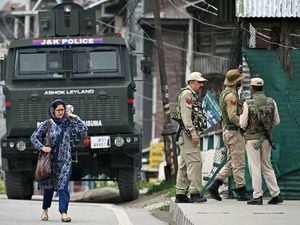A series of chilling cold cases across the United States have recently come back to the forefront, capturing public attention and raising questions about justice and closure for families affected by unsolved murders.
One such case is the 2007 murder of Bethel Ann Rawls, who was found dead inside her southwest Houston apartment. After nearly 17 years, police reopened the case and arrested Anthony Lankford, identified as Rawls’ co-worker, based on compelling DNA evidence.
Rawls’ family expressed relief at the arrest, as her sisters recounted their hopes of seeing justice served for their beloved Burt, whose life was tragically cut short. Janice Delry expressed her pain, stating, "He took my sister, and even though she's gone, she's always in my heart."
Prosecutors revealed horrifying details during Lankford's court appearance, describing the brutal nature of Rawls’ death. According to the allegations, Lankford beat, strangled, and even stabbed Rawls, leaving behind gruesome evidence.
Interestingly, his DNA was discovered under Rawls’ fingernails, providing key evidence linking him to the crime. Despite being questioned at the time of the murder, Lankford was not initially considered a suspect.
About six months prior to his arrest, the police had quietly reexamined the case, leading to Lankford’s identification as the suspect. His eventual confession to providing DNA samples matched those collected at the crime scene, firmly solidifying the case against him.
Meanwhile, the saga surrounding the unsolved murders of Jean C. Robinson and her daughter, Allison “Joy” Cumming, adds another layer of complexity to this probing narrative. The bodies were discovered two days after Christmas 2023, concealed on the property of Joy's small business, the Pawsitive Dog Kennel, located in Farmington, Maine.
The Maine State Police classified the deaths as homicides, yet no suspects or motives have emerged to explain the chilling attack. With over 230 days passing without resolution, the community grapples with unanswered questions, and the investigation remains fraught with uncertainty.
A new dimension surfaced when John “Neville” Cumming Jr., Joy’s brother, was found dead just days after the discovery of his mother and sister. Law enforcement has not officially linked his death to the murders, though local sources suspect it might be intertwined with the horrifying events surrounding the family.
Cumming Jr.’s suicide has sparked rampant speculation about the motivations behind the earlier killings, with some community members asserting dangerous theories. Joy’s brother had been under scrutiny, prompting authorities to engage with his connections shortly before his passing.
Adding to the emotional turmoil, Bill Cumming Sr., the father of Neville and grandfather to the victims, voiced his grief over losing three family members within such proximity. "The police have told me absolutely nothing about what happened," he said, showcasing his frustration and need for answers.
Meanwhile, the outdated nature of the investigations impacts the lives of those yearning for closure. From Texas to Maine, families remain haunted not only by the pain of their loved ones' losses but also by the lingering questions of what really transpired.
Another case gaining attention is the unresolved murder of Danielle Clause, found dead on July 16, 1991, in California. After decades of searching for answers, advancements in DNA technology have finally allowed police to pinpoint Larry Devon Welch as her murderer, but he passed away years earlier.
The decades-long mystery brought to light how DNA evidence could finally yield results previously thought impossible. Marcie Forte, Clause’s sister, described her sibling as more than just a victim, stating, “She was (an) artist, a daughter, a sister, a mother, and a wife.”
Despite the resolution for Clause’s family, many cold cases remain unsolved, leaving victims’ families yearning for closure. The Ventura Police Department continues to work on 25 additional cold cases involving killings and missing persons, emphasizing the struggle for justice for the lost.
Lastly, two Las Vegas sisters, Skylar Bailey and Emiley Ridout, along with Nathan Nava, face serious charges after allegedly luring and then shooting another man during what authorities describe as a robbery scheme. They stand accused of open murder, along with conspiracy to commit robbery, showcasing how wildly varied cases of violence can be across the nation.
These cases underscore the emotional distress, unresolved grief, and the lingering questions surrounding murder investigations. When loved ones are taken away violently, and the reasons remain obscured, the search for truth can feel endless.
Families seeking resolution often confront the stark reality of the slow-moving gears of justice, hoping for eventual closure as investigations drag on. Cold cases, like frozen memories, linger, many unresolved, accentuating the desire for answers—questions about motive, opportunity, and ultimate fate remain unanswered.
The quest for resolution isn’t just about crime-solving, it’s deeply personal. For survivors, it’s about preserving their loved ones’ memories and achieving some semblance of peace amid the horror.
For the families of Rawls, Clause, Robinson, and Cumming, this fight for clarity remains central to their healing. The tragedies resonate not only within their immediate circles but ripple through communities desperately seeking closure for lost lives.



